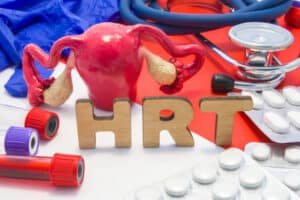What Is HRT?
I get this question from patients all the time: “What is HRT?”
Simply put, hormone replacement therapy (HRT) is a treatment for women whose estrogen and progesterone levels drop as a result of menopause and for men whose testosterone levels drop as a result of andropause or male menopause. It may also involve other hormones as well. What HRT does is supply a person with appropriate levels of essential hormones.
In other cases HRT refers to a hormone treatment for men, or for individuals undergoing a sex change, but this post focuses on HRT as a treatment for women going through menopause.
What is HRT? A Treatment For Menopause Symptoms

When menopause approaches, estrogen and progesterone levels drop. In order to combat this some women benefit from replenishing their hormones, which reduces symptoms caused by menopause.
You’ll know when your estrogen levels are dropping because you’ll experience some of the following symptoms:
- Hot flashes
- Night sweats
- Mood swings
- Difficulty sleeping
- Dry itchy skin,eye and/or vagina
- Urinary problems
- Hair loss
- Concentration and memory difficulties
- Accumulation of fat in the abdomen
HRT can help relieve these symptoms and have you feeling like yourself again.
What Is HRT? – The Benefits
HRT is approved for the relief of menopausal symptoms and the prevention or treatment of osteoporosis. Studies show that these are some of the benefits you can expect when going through HRT.
- Relief of menopausal symptoms: Women who who receive HRT soon after menopause have been able to dramatically reduce the symptoms of menopause such as hot flashes, night sweats, impaired memory, dry skin and vagina, and others.
- Improved bone and muscle mass: HRT is known to increase bone density and the addition of testosterone and DHEA may increase muscle or lean body mass. HRT improved muscle function in women, even down to the muscle fiber.
- Lowers cholesterol and prevents plaque from forming on blood vessels. It may even lower the risk of obesity by controlling blood sugar and insulin sensitivity.
- Lowers mortality rate in younger postmenopausal women: According to The American Journal of Medicine, HRT “almost undoubtedly” decreased mortality in women whose menopause arrived early.
What Is HRT? – There Are Three Main Types
There are three main types of HRT, which include:
- HRT with only estrogen: HRT treatment without progesterone for women who have had a hysterectomy where their uterus and ovaries have been removed. Although this is common practice, progesterone has receptors in the brain, breast and other tissues and even women with a hysterectomy can benefit from adding progesterone.
- Cyclical HRT: A treatment for patients who are still menstruating but have perimenopausal or menopausal-like symptoms. The cycles may be monthly, which includes a dose of both estrogen and progestogen dose at the end of the menstrual cycle for 14 days. Or you may be prescribed or a daily dose of estrogen and progestogen for 14 days every 13 weeks.
- Continuous HRT: A treatment used for post-menopausal patients. They take a continuous combination of estrogen and progestogen.
HRT can be applied to the skin or vagina, and some may be given orally. You will be given the lowest dose that relieves symptoms and is in safe range. Doses are adjusted to symptoms and hormone levels until the appropriate amount for you is determined.
Conclusion
When considering whether or not HRT is right for you, it is important to have a discussion with a functional medicine doctor familiar because everyone metabolizes the treatments differently.
A good physician will take into account your individual risk factors, symptoms, levels and other factors. The physician will then customize a program just for you.
In the end it’s your decision, so be sure to educate yourself, but the bottom line is there’s no need to suffer. If you have symptoms, consider hormone replacement options.





She is a recognized and award-winning holistic, functional, integrative and anti-aging healthcare practitioner, speaker and author, and has been featured in ABC News, Forbes, WOR Radio and many media outlets to spread the word that you can live younger and healthier at any age.